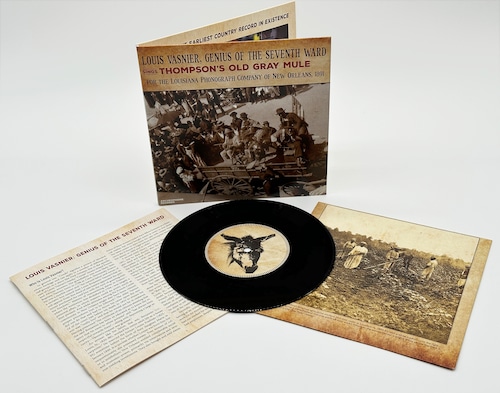The oldest known country recording is currently a recently unearthed rendition of Thompson’s Old Gray Mule.
The decades-old song was sung by whom? It turned out to be New Orleans-born Black artist Louis Vasnier.
The discovery was made ten years ago when collector John Levin paid $100 for a box of wax cylinders at an auction in coal country in Pennsylvania. Before Levin installed one of the deteriorating cylinders on his handmade player, the cylinders—which turned out to be the earliest commercial medium of recorded music—sat in his home for years. Then a country tune that was 133 years old started playing.
Riley Puckett and Uncle Dave Macon, two hillbilly masters, later recorded the song.
Levin called the discovered track a real unicorn and knew he had hit gold right away.
Unicorns are categorized as cylinders that are believed to exist but have never been discovered in early recordings.
The 1891 concert is now available on a 45 rpm record from Archeophone, a specialty label that specializes in recovering recordings from the 19th century. Label co-founder Rich Martin discovered that the oldest country recording was made by a Black guy when studying Vasnier.
“It may be the most significant thing we’ve ever released,” his wife and co-producer Meagan Hennessey told The Washington Post.
The little label, which was established in 1998 and is renowned for its amazing finds, is also the source of another tune that Levin happened to find: a song by Charles Asbury that was found to be the oldest banjo recording still in existence. Asbury was Black, too.
Martin wants to draw attention to the complex relationship that country music has had with race for a very long time. After all, it wasn’t until 2000 that Charley Pride, the first Black performer inducted into the Country Hall of Fame, was honored. Two more joined him after that, bringing the total number of members to 155.
According to Martin, who spoke to The Washington Post, “Black artists, who were the ones who performed and recorded, are generally eliminated because they say, Well, it’s not really country.” Thus, ours is a reclamation project in part.
Martin’s revelation did not come as a surprise to Rhiannon Giddens, the musician and scholar whose banjo was featured on Beyoncé’s No. 1 smash, Texas Hold Em. According to Gidden’s research, there is frequently a discrepancy between the person who composed the song and the person who is given credit for it.
Giddens told the publication, “We shouldn’t have to do this at all.” This should have been a part of the tale from the beginning. However, since you can see the divisions and the current state of affairs in the United States, as well as how even the debate over whether Beyonc is permitted to exploit country music for political purposes, we decided to put in the effort.
What transpired with Vasnier’s narrative is consistent with Archeophone’s objective, which is to discover and disseminate the true history of recorded sound.
Martin depends on collectors like Levin, who has over 3,000 of them in his California home and will eventually donate them to the University of California at Santa Barbara.
Levin created a unique player from which Martin mastered the sound file. Depending on the parts, he sells those systems for anywhere between $25,000 and $40,000.
Levin told The Washington Post, “I treat these things, they’re like polar bears or the California condor.” They are essentially being annihilated if they are not brought in from the wild. They are soft wax and move from private collector to private collector every ten or twenty years. They break if you drop them on a table from a half-inch distance.
Martin and Hennessey are dedicated to publishing book-length liner notes with fresh research in addition to releasing classic songs.
Numerous nominations and awards have been given in recognition of their efforts.
For Lost Sounds: Blacks and the Birth of the Recording Industry, 1891-1922, Archeophone received a Grammy in 2006. The album Centennial, which is devoted to King Oliver’s recordings from 1923, was only nominated for two Grammys.
Vasnier’s recording may be found on CD 3 of that collection, which contains tunes that influenced Louis Armstrong and Oliver’s performance.
Martin and Hennessey both emphasized the significance of the discovery, pointing out that the song might be overlooked in the four-CD set.
It is, after all, the reason that Thompson’s 45 rpm record, Old Gray Mule, was released this month.
Stories by
EmilyAnn Jackman
Note: Every piece of content is rigorously reviewed by our team of experienced writers and editors to ensure its accuracy. Our writers use credible sources and adhere to strict fact-checking protocols to verify all claims and data before publication. If an error is identified, we promptly correct it and strive for transparency in all updates, feel free to reach out to us via email. We appreciate your trust and support!

